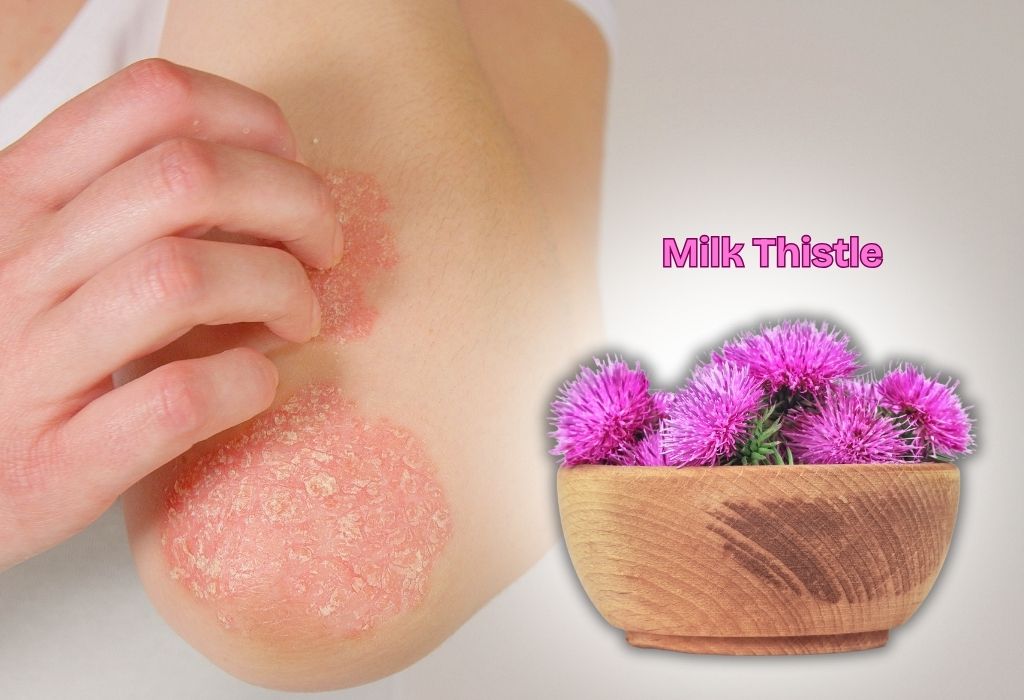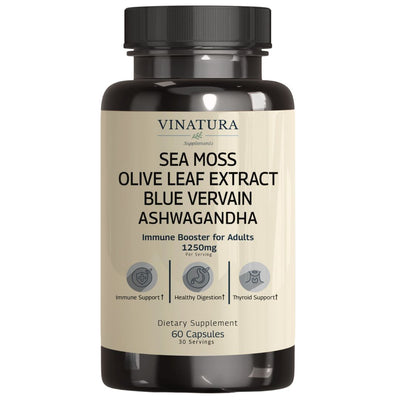
Does Milk Thistle Help Psoriasis?
Milk thistle is evaluated as an effective solution for psoriasis. It primarily works through antioxidant mechanisms, and immune system regulation, naturally soothing and reducing itching and dryness. This therapy is supported by research and feedback from experts and user communities. This article will provide specific insights into the mechanisms and effects of milk thistle on psoriasis.
Before exploring further, please read the disclaimer located at the end of this webpage.
Key Takeaways
- Milk thistle benefits psoriasis through its antioxidant and immune-regulating effects.
- The recommended dosage for milk thistle in psoriasis is 200-400 mg, divided into multiple daily doses.
- Milk thistle may cause side effects or drug interactions.
What Is Psoriasis?
Psoriasis is a common dermatological condition characterized by the appearance of scaly patches on the skin, thick patches that can develop and spread, causing pain and itching. This condition often occurs due to immune system dysfunction, which can cause skin cells to grow too quickly [1].
Psoriasis often appears on the scalp, elbows, or knees and goes through cycles of flare-ups and remissions. Depending on the severity, there are various ways to support recovery from this condition, including prescribed oral medications, topical creams, or injections.
However, if you seek a natural recovery method, milk thistle is one of those options.
Read more: Does Milk Thistle Help With Hangovers?
What Are Psoriasis Symptoms?

Symptoms of psoriasis vary from person to person; here are some common signs to quickly identify and address:
- Red, inflamed skin with thick, white-silver scales that itch or burn.
- Dry, cracked, itchy, or bleeding skin patches.
- Thickened nails with ridges and grooves.
- Reduced sleep quality.
Significantly, untreated psoriasis can progress to psoriatic arthritis [2], a condition where inflammation progresses to affect the joints, tendons, and ligaments, causing pain. Some patients may experience joint pain before skin lesions appear.
It's crucial to consult a doctor immediately if you notice any of these symptoms.
Does Milk Thistle Help Psoriasis?
Milk thistle offers many benefits for psoriasis.
If you've heard of milk thistle, you're likely aware of its exceptional benefits for liver health. This effect is due to the critical component silymarin in milk thistle.
Silymarin compounds have antioxidant properties, including at least four closely related flavonolignans, with 60 to 70% being a mixture of 2 diastereomers of silybin. Silymarin has been studied in both humans and animals, showing potential benefits for patients with liver diseases such as hepatitis and cirrhosis [3].
This antioxidant action of silymarin also benefits skin-related conditions, especially psoriasis. The exact mechanism will be detailed below.
Learn more: Does Milk Thistle Help Lower ALT Levels?
How Does Milk Thistle Benefit For Psoriasis?
Antioxidant

As mentioned earlier, milk thistle has antioxidant properties, which are the significant benefits.
Through a series of studies conducted on patients with cirrhosis and accompanying type 2 diabetes, Keri Wellington and colleagues concluded that silymarin has significant antioxidant and anti-fibrotic activities while inhibiting cancer cell development [3].
Immune Regulation
The leading cause of psoriasis is immune system imbalance; silymarin in milk thistle regulates the immune system.
Silymarin can inhibit the activation and proliferation of T cells, a type of lymphocyte crucial to the body's immune system. Additionally, this component affects the activation pathway and translocation of the immune system [4]. These immune-regulating effects significantly contribute to the benefits of milk thistle for psoriasis.
How Much Milk Thistle For Psoriasis Dosage?

Due to its potential health benefits, milk thistle is available in various supplemental forms such as capsules, tea, or liquid extract.
To fully harness the benefits of milk thistle, it is essential to consider your dosage and usage. The dosages we provide below are for reference purposes only. For the most accurate dosage tailored to your psoriasis condition, consult a healthcare professional:
- Capsule form: 200-400 mg, divided into two doses daily (once daily if your body is accustomed to milk thistle extract).
- Liquid form: 30-40 drops, divided into three doses daily.
Again, adhering to the recommended dosage on product packaging or healthcare provider's instructions should be prioritized to minimize potential side effects or dangerous drug interactions.
Potential Side Effects And Precautions Of Milk Thistle

Similar to other supplements, when used at high doses, milk thistle may cause potential side effects such as abdominal pain, nausea, indigestion, and diarrhea. Additionally, individuals allergic to plants in the ragweed or daisy family should exercise caution when using this herb.
Milk thistle is not recommended for use by pregnant or nursing women, individuals with breast cancer, endometriosis, or estrogen-related disorders.
Regarding drug interactions, milk thistle poses a risk of toxicity when combined with medications such as statins for high cholesterol, blood thinners, cancer-supportive therapies, and allergen medications.
Always remember to consult and discuss with a physician about your health condition and potential drug interactions before use.
Other Ways To Manage Psoriasis At Home
In addition to supplementing with milk thistle, incorporate the following home remedies to manage psoriasis:
- Supplement with omega-3 fish oil extracts, vitamin D, aloe vera, Oregon grape, and evening primrose oil.
- Moisturize the skin using moisturizing creams or indoor humidifiers.
- Promptly soothe redness with aloe vera.
- Limit exposure to UV rays and sunlight.
- Reduce stress, alcohol consumption, and smoking.
- Effectively manage weight as obesity can exacerbate psoriasis.
Conclusion
In conclusion, milk thistle contains beneficial nutrients for psoriasis, particularly its antioxidant effects, which help alleviate symptoms of redness, itching, and scaling associated with psoriasis. However, using milk thistle for psoriasis should be done under an expert's supervision and strictly adhere to recommended dosages.
References
- [1] Branch, NIAMS Science Communications and Outreach. “Psoriasis.” National Institute of Arthritis and Musculoskeletal and Skin Diseases, 12 Apr. 2017, www.niams.nih.gov/health-topics/psoriasis
- [2] NIAMS. “Psoriatic Arthritis.” National Institute of Arthritis and Musculoskeletal and Skin Diseases, 14 Apr. 2017, www.niams.nih.gov/health-topics/psoriatic-arthritis.
- [3] Wellington, Keri, and Blair Jarvis. “Silymarin: A Review of Its Clinical Properties in the Management of Hepatic Disorders.” BioDrugs, vol. 15, no. 7, 2001, pp. 465–489, https://doi.org/10.2165/00063030-200115070-00005. Accessed 28 Jan. 2020.
- [4] Arif, Tasleem, et al. “Silymarin: An Interesting Modality in Dermatological Therapeutics.” Indian Journal of Dermatology, Venereology and Leprology, vol. 84, no. 2, 2018, p. 238, https://doi.org/10.4103/ijdvl.ijdvl_746_16. Accessed 15 Sept. 2022.
Author

Product Disclaimer
Including an ingredient or study does not evaluate, endorse, or recommend any Vinatura product or any third-party product. Some ingredients discussed may not be used in any Vinatura product.
The content of the articles has not been evaluated by the Food and Drug Administration (FDA) and is not intended to promote or endorse any specific product. Any products sold on this website are not intended to diagnose, treat, cure, or prevent any disease.
Opinions and Endorsements
Any claims, statements, or opinions expressed in the articles are those of the author(s) and do not necessarily reflect the views or opinions of the manufacturers of the dietary supplement products. The products sold on this website are separate from the content of the articles and are not directly endorsed or associated with the information presented here.
Liability Disclaimer
The author(s) of the articles, website, and manufacturers of the dietary supplement products do not assume any liability for any potential consequences arising from the use of the information provided in the articles. Ingredient effects, dosages, and safety vary by individual, formulation, and context; some ingredients interact with medications or may be unsuitable during pregnancy or lactation. It is recommended that individuals consult with a qualified healthcare professional before making any dietary or lifestyle changes, including the use of dietary supplements.
Product Usage
Please refer to the product labels and packaging for specific usage instructions and guidelines for the dietary supplement products sold on this website.
Customer Support
For any concerns or questions regarding the dietary supplement products, please contact our customer support team, who will be more than happy to assist you.





Leave a Comment
Be the first to comment.
What do you think?